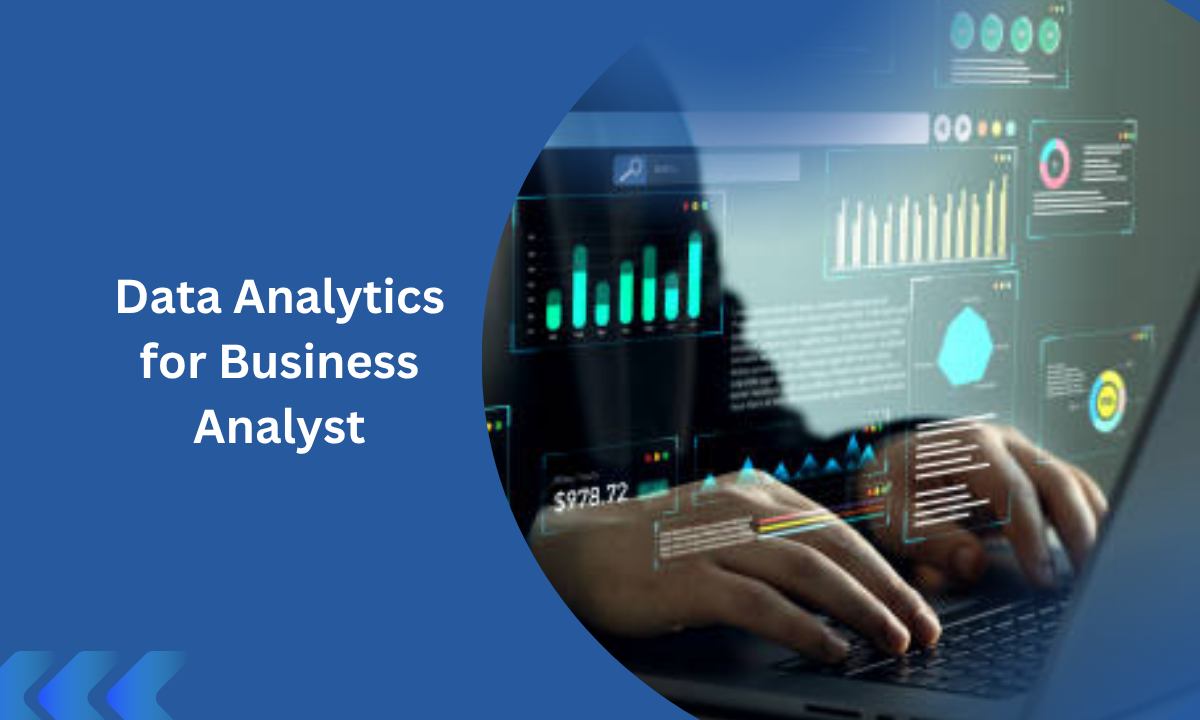Table of contents:
|
1. What Is Data Analytics? |
|
2. Why Data Analytics Is Crucial for a Business Analyst
|
|
3. The Advantages of Data Analytics You Will Leverage |
|
4. How Data Analytics Powers Business Decision Making |
|
5. The Imperative Role of Training: Data Analytics Course in Bangalore & Institutes |
|
6. When You Use Data Analytics as a Business Analyst |
|
7. Conclusion |
|
8. FAQs |
When I first began training future analysts at Apponix, one thing stood out clearly: mastering Data Analytics for Business Analyst roles is not just a nice-to-have, it’s the core skill that differentiates a good analyst from a great one. In an era flooded with data, knowing what is data analytics pipeline is, interpreting insights, and applying them to real decisions is no longer optional.
As a trainer, I’ve seen how equipping learners with rigorous analytics skillsets turns them into trusted advisors across business units. In this post, I’ll walk you through the importance of data analytics in business, why data analysis importance cannot be overstated, the advantages it brings, and how this empowers analysis for business and data analytics for business decision making. Also, I’ll explain how training, such as the Data Analytics Course in Bangalore, plays a pivotal role in enabling this transformation.
What Is Data Analytics?
Before we dive deeper, let’s clarify: what is data analytics in the business context?
Data analytics refers to the process of collecting, cleaning, transforming, modeling, and interpreting data to generate actionable insights. It turns raw numbers into stories about trends, performance, opportunities, and risks. When done well, it becomes a foundation for strategy, not merely reporting.
In essence, a business analyst uses data analytics as a lens to answer: What’s happening? Why is it happening? What might happen next? And what should we do about it?
Why Data Analytics Is Crucial for a Business Analyst
1. Driving Evidence-Based Decisions
One of the key pillars I emphasize in class is that gut instinct, while useful, can only take you so far. In modern organizations, decision-makers expect evidence. Data analytics for business decision-making bridges that gap. It replaces guesswork with validated insight, helping teams allocate budgets, optimize processes, and launch strategies backed by proof.
2. Understanding Customer and Market Trends
With data, you can dive deep into customer behavior, preferences, buying cycles, and pain points. This understanding fuels product improvement, segmentation, and marketing strategy. Companies using analytics stay ahead by detecting shifts early.
3. Operational Efficiency & Cost Control
Data analytics pinpoints inefficiencies and bottlenecks in business processes. As a business analyst, you’ll recommend optimizations, cutting waste, reallocating resources, and boosting productivity. That’s a direct impact on the bottom line.
4. Predictive Insights & Anticipation
Beyond looking backwards, data analytics allows forecasting. As a business analyst, you’ll use predictive models, trend analysis, and scenario simulations to anticipate risks and opportunities before they emerge. This ability is a game-changer.
5. Competitive Advantage
In equipping organizations with timely and accurate insights, data analytics creates a competitive moat. Companies that understand their data can pivot faster, spot hidden opportunities, and differentiate themselves in crowded markets.
6. Supporting Innovation and Strategy
When product teams and leadership see metrics, they can iterate, test hypotheses, and design experiments. A business analyst using data analytics becomes a strategic partner—helping shape the future direction, not just reporting what’s in the rearview mirror.
The Advantages of Data Analytics You Will Leverage
-
Clarity & Focus: Data analytics removes ambiguity. You’ll know which KPIs matter and where to direct efforts.
-
Faster Insights, More Agility: Automation, dashboards, and real-time analytics let you react quickly.
-
Scalable Insights: As data volumes grow, tools and analytics pipelines scale—enabling you to handle complexity.
-
Better Stakeholder Trust: When your recommendations are backed by numbers, you build credibility across departments.
-
Measurable ROI: You’ll quantify impact—whether in cost savings, improved conversions, or growth metrics.
These advantages are the very reasons analysis for business becomes indispensable in today’s data-driven world.
How Data Analytics Powers Business Decision Making
Let me walk you, as I walk my learners, through the flow of how analytics becomes decision support:
1. Data Capture & Storage: Combine sales, CRM, web analytics, operations, and more.
2. Cleaning & Preparation: Handle missing values, outliers, and inconsistencies.
3. Exploratory Analysis: Understand distributions, correlations, and anomalies.
4. Modeling & Forecasting: Build statistical or machine learning models.
5. Evaluation & Validation: Test models, cross-validate, and check assumptions.
6. Interpretation & Presentation: Translate results into narrative, visuals, and dashboards.
7. Action & Feedback: Recommend changes, monitor outcomes, and refine further.
As you master each step, your insights become sharper, and your decisions more trusted.
The Imperative Role of Training: Data Analytics Course in Bangalore & Institutes
From my vantage point at Apponix, I have witnessed many aspirants capable of logical thinking and business sense but lacking in structured analytics methodology or tool proficiency. That’s where a good data analytics course in Bangalore comes in. These programs often cover:
-
Fundamentals of data (types, cleaning, transformation)
-
Statistical concepts (hypothesis testing, regression, clustering)
-
Tools and languages (Python, R, SQL, Excel, Power BI, Tableau)
-
Real-world projects and case studies
-
Business domain applications and decision support
One such course is offered by Apponix, designed to bridge the gap between analytics theory and industry practice.
Our training institute in Bangalore also contributes to the ecosystem, offering cohorts tailored to working professionals and freshers alike.
The value of these programs is not just in teaching what to do, but how and why. As a trainer, I stress project-based learning, exposure to messy real datasets, and a mindset of curiosity; these are what transform learners into analysts that organizations value.
When You Use Data Analytics as a Business Analyst
Think of these scenarios—this is when analytics becomes your everyday tool:
-
Determining which product lines underperform and why
-
Forecasting sales or demand for budgeting
-
Segmenting customers based on behavior for targeted campaigns
-
Analyzing marketing ROI and optimising channel spend
-
Monitoring operational KPIs to detect anomalies
-
Evaluating user feedback, churn, or retention metrics
-
Crafting “what-if” scenarios to support strategic planning
In each case, data analytics is the engine converting data into guidance.
Conclusion
As a trainer at Apponix, I have watched many students transform from “curious learners” into confident business analysts, and the pivotal shift always centres around mastering data analytics for business analyst roles. Without analytics, your recommendations risk being dismissed as opinions. With analytics, your insights become persuasive, dependable, and action-oriented.
The importance of data analytics in business cannot be overstated: it propels efficiency, sharpens strategy, builds competitive edge, and anchors decisions in reality. For you as a business analyst, embracing analytics means moving from a reactive role to a strategic partner in your organization’s growth journey.
If your goal is to thrive in analytics-driven business environments, enrolling in a structured Data Analytics Course in Bangalore at Apponix, our training institute in Bangalore, is the first critical step. In that course, you will not only learn tools and methods but also internalize a mindset of inquiry, skepticism, and iteration skills that last you a lifetime.
Let me close with some questions I have often heard from learners, and my responses:
FAQs
Q: What is “data analytics importance” compared to plain reporting?
Reporting shows what happened. Data analytics digs deeper, why it happened and what might happen next, thus informing strategy, not just status checks.
Q: Can someone without a technical background learn data analytics?
Absolutely! Most good training institutes (including Apponix) start with fundamentals, Excel, statistics, and business thinking before moving to tools. With consistent effort and mentorship, non-technical learners succeed too.
Q: What advantages does data analytics give in real business roles?
You’ll offer clarity, credibility, measurable outcomes, predictive insight, and the capacity to influence high-stakes decisions. That is far beyond just producing dashboards.
Q: Why choose a training institute in Bangalore?
Because Bangalore is a tech and startup nucleus, learners get exposure to live projects, peer networks, internships, and placement opportunities. The ecosystem accelerates your growth.
Q: How soon can I start applying analytics in a real job?
As soon as you have confidence in the basic steps: cleaning, analysis, visualising, and interpretation, you can pitch small projects. Even junior analysts are expected to deliver incremental insights early on.
Q: How does Apponix help as a trainer and institute?
At Apponix, we focus on hands-on learning, real datasets, mentorship ratios, and bridging analytics with business domains. As your trainer, I prioritize your clarity, your confidence, and your ability to articulate insights, not just tool mastery.





